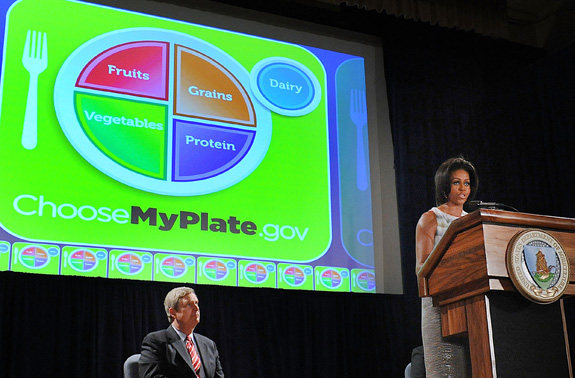Healthy Eating Eluding Many With Disabilities

First Lady Michelle Obama and Agriculture Secretary Tom Vilsack, left, unveiled a new healthy eating symbol, “My Plate,” in 2011. New research suggests that most Americans with disabilities are not following recommended dietary guidelines. (Olivier Douliery/Abaca Press/MCT)
People with disabilities are falling far short when it comes to consuming recommended levels of vitamins and other nutrients, researchers say.
Most Americans do not adhere to daily nutrition recommendations, but a new study finds that those with disabilities are fairing below average.
Researchers looked at data on nearly 12,000 people — including over 4,200 with various disabilities — who participated in the government’s National Health and Nutrition Examination Surveys, which inquire about food and supplement intake.
Advertisement - Continue Reading Below
They found that most U.S. adults eat too much saturated fat, cholesterol and sodium and do not take in recommended levels of vitamin A, vitamin C, vitamin D, calcium and iron.
People with disabilities were even less likely to follow guidelines on saturated fat, fiber, vitamin A, vitamin C, calcium and potassium, according to findings published in the Journal of Human Nutrition and Dietetics.
What’s more, those with the most severe disabilities — whether physical or mental — were least likely to report good nutritional habits, the study found.
A variety of factors are likely contributing to poor nutrition among this population, according to Ruopeng An of the University of Illinois who led the study.
Medication can interfere with appetite and people with disabilities may have dietary restrictions, experience physical difficulty going to the grocery store or preparing food and they may face financial barriers to purchasing healthy items, he said.
“Policymakers and activists for the disabled traditionally have focused primarily on improving transportation options and the physical accessibility of buildings, roads, paths and parking lots,” An said. “Now it’s time for them to turn their attention to the nutritional challenges that confront people with disabilities.”
Read more stories like this one. Sign up for Disability Scoop's free email newsletter to get the latest developmental disability news sent straight to your inbox.


